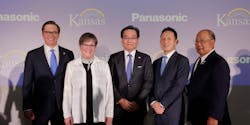Panasonic Picks Kansas to House New $4 Billion EV Battery Plant
Amid reports that the existing U.S. supply chain for electric-vehicle batteries is unprepared for electrification, Panasonic Energy Co. announced Wednesday evening it would build a new $4 billion EV battery plant in Kansas. According to a company release, the plant could create up to 4,000 new jobs at a new site in De Soto, Kansas, on the Western border of Kansas City.
Gov. Laura Kelly called the announcement a “milestone for Kansas” and anticipated it would be a growth opportunity for the state. “This project will be transformative for the Kansas economy, providing high-quality, high-tech jobs while bringing a new industry to the state,” she said.
Kazuou Tadanobu, CEO of Panasonic Energy Co., said the new plant would be instrumental for a coming wave of electrified cars. “With the increased electrification of the automotive market, expanding battery production in the U.S. is critical to help meet demand,” he said, citing Panasonic’s long experience in the technology industry.
Tadanobu may have understated the situation, as recent months have seen several alarm bells rung over the lack of EV batteries. In June, the Coalition for a Prosperous America issued a report claiming the U.S. will have to import more than half of its EV batteries and that it will only fall further behind China in production by 2025. And back in April, CEO RJ Scaringe of EV company Rivian warned that the supply issue is global. In comments reported by the Wall Street Journal, Scaringe said that “90% to 95% of the supply chain” necessary to sustain electric vehicle companies in 10 years “does not exist.”
The Panasonic announcement comes about two weeks after Paris-based Forsee Power announced it would build its own first U.S. EV battery plant near Columbus, Ohio. Forsee said at the time it expects to invest $13.6 million in the plant, recruit 150 employees, and reach 3 GWh of production capacity by 2027.
About the Author
Ryan Secard
Associate Editor
Ryan Secard joined Endeavor B2B in 2020 as a news editor for IndustryWeek. He currently contributes to IW, American Machinist, Foundry Management & Technology, and Plant Services on breaking manufacturing news, new products, plant openings and closures, and labor issues in manufacturing.
